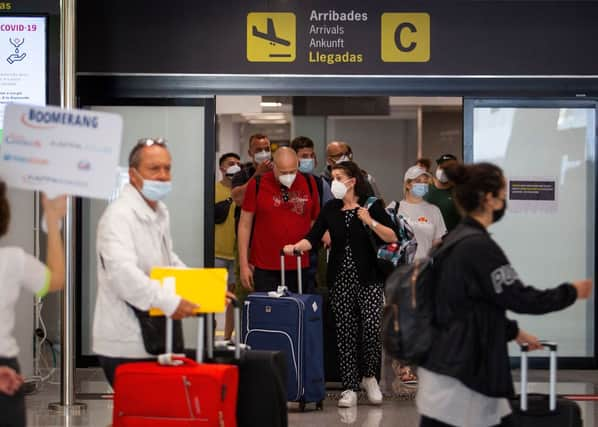'It's not going to happen': Spain avoids being placed on UK Red travel list as Beta Covid cases drop


Spain has managed to avoid being placed on the Government’s Red travel list in the latest update to travel guidance from the Department for Transport and Department of Health and Social Care.
There had been fears that Spain could be moved to either the Red list, a new category called the Amber watchlist, or possibly the Amber Plus list, alongside France, due to concerns regarding the number of Covid cases of the Beta variant.
This is what you need to know.
Why isn’t Spain on the red list?
Advertisement
Hide AdAdvertisement
Hide AdSpain has avoided being placed on the Red list due to a significant fall in Covid cases, and also because of concerns that there would not be enough hotel rooms for holiday goers to quarantine upon arrival in England, as is the rules for those returning from Red list locations.
According to the latest data, the Government has booked 58,000 hotel rooms on reserve for the quarantine system.
According to The Times, a Whitehall source said: “Spain won’t be going on the Amber watchlist - the only danger is it going red but that’s very unlikely. Cases are coming down. And they haven’t got enough beds to quarantine everybody. So it’s not going to happen.”
Ministers will announce on Thursday (5 August) that Spain will remain in its current position on the Amber list.
Advertisement
Hide AdAdvertisement
Hide AdAdditionally, between 10 and 15 countries could be added to the Green list, which allows all travellers to avoid the requirement to quarantine.
The countries expected to be added to the Green list include Germany, Austria, the Czech Republic, Slovakia, Slovenia, Romania and Poland.
Loading....
What are the rules for Amber list countries?
For those returning from an Amber list location to England, prior to travel, you must:
- Take a Covid-19 test, which must be taken three days before you travel to England
- Book and pay for Covid-19 tests to be taken after arrival in England
- Complete a passenger locator form
On arrival in England, you must:
- Quarantine at home or in the place you are staying for 10 days
- Take a Covid-19 test on or before day two and on or after day eight
If you are fully vaccinated, or under the age of 18, you do not have to quarantine or take a day eight test after arriving in England.
Advertisement
Hide AdAdvertisement
Hide AdYou must have had your final dose of the vaccine at least 14 whole days before the date you arrive in England, and you still need to book and take a day two test.
Will the Amber watchlist become a category?
While the Government had considered the new category, ministers have since abandoned plans for the possible Amber watchlist as Prime Minister Boris Johnson promised to keep travel rules as simple as possible.
Government sources confirmed there would be “no Amber watchlist” following backlash by Tory MPs, ministerial concerns and complaints from the travel industry.
Huw Merriman, Tory chairman of the Commons Transport Committee, told the BBC: “An Amber watchlist will be viewed as a massive red flag which is likely to cause bookings to those countries on that watchlist to collapse.”
Advertisement
Hide AdAdvertisement
Hide AdLabour Party chairwoman Anneliese Dodds warned against creating “additional confusion and chaos” through an Amber watchlist.
“The problem is, right now holidaymakers just don’t know who to believe,” she told Times Radio,” adding that we “seem to have the Chancellor briefing against the Prime Minister in the Sunday papers”.
“That’s not building confidence, ultimately, in the system.”
Travel expert Paul Charles, chief executive of The PC Agency consultancy firm, told ITV’s Good Morning Britain programme: “It would be a disaster to bring in an amber watchlist on top of the amber list, the green list, the red list.”
Advertisement
Hide AdAdvertisement
Hide AdCurrently there is an Amber Plus list which, at the moment, only contains France and requires passengers to self isolate regardless of vaccination status despite the relaxation of rules for journeys elsewhere in Europe.